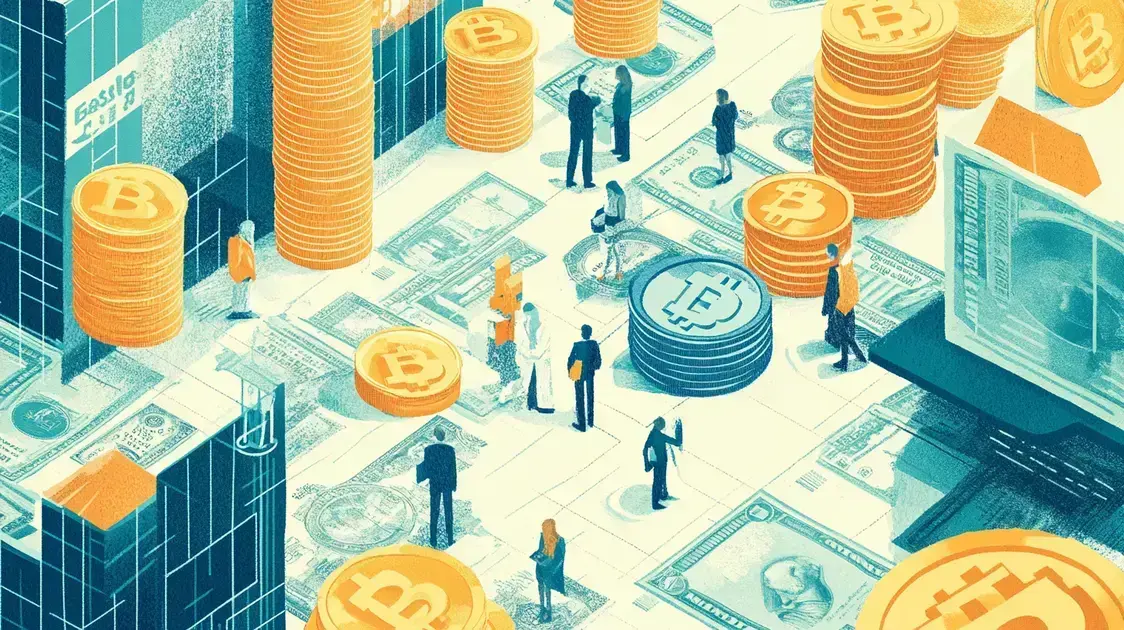The decentralized finance (DeFi) revolution is reshaping the financial world by eliminating intermediaries. This shift allows users to conduct transactions directly, reducing costs and increasing efficiency. With greater control over funds, individuals can manage their assets without relying on traditional banks.
Beyond cost savings, DeFi introduces innovative earning opportunities. Staking, liquidity pools, and yield farming provide new ways to generate passive income. However, challenges such as regulatory uncertainty and market volatility remain significant concerns, requiring users to stay informed and cautious.
Despite these hurdles, the future of DeFi holds immense potential for accessibility and improved user experiences. As technology evolves, more people will gain access to financial services that were previously out of reach. Keep reading to explore how DeFi is transforming the way we interact with money.
Understanding Decentralized Finance
The understanding decentralized finance begins with recognising how it differs from traditional finance. Decentralized finance, commonly referred to as DeFi, operates on blockchain technology, which allows for financial transactions without intermediaries like banks. This means that users can lend, borrow, and trade without needing to rely on a central institution.
What is DeFi?
DeFi is a movement that creates an open-source financial system accessible to anyone with an internet connection. It leverages smart contracts on blockchain platforms like Ethereum to facilitate various financial services such as trading, lending, and earning interest on digital assets.
Key Components of DeFi
Some key components of DeFi include decentralised exchanges (DEXs), which allow users to trade cryptocurrencies directly with one another. Other elements include liquidity pools, where users provide funds to receive trading fees and interest, and stablecoins, which are pegged to stable assets to reduce volatility.
Why Decentralisation Matters
Decentralisation is crucial in DeFi. It promotes transparency since all transactions are recorded on a public ledger. Users maintain control over their assets, reducing the risk of corruption or mismanagement by central authorities.
The Role of Smart Contracts
Smart contracts are self-executing contracts with the agreement directly coded into them. This automation reduces the need for trust and enables users to execute transactions safely and quickly. Understanding how smart contracts function is vital to grasping the potential of decentralized finance.
In summary, understanding decentralized finance is about exploring this innovative approach that empowers individuals and challenges the traditional financial system. DeFi paves the way for a more inclusive, transparent, and efficient financial ecosystem.
Key Features of DeFi
The Key Features of DeFi are what set it apart from traditional finance. By leveraging blockchain technology, DeFi creates new financial opportunities for everyone. Here are some essential features:
Decentralised Control
Decentralised finance operates without central authorities like banks. This means users have full control over their funds, reducing the risk of loss due to mismanagement.
Accessibility
DeFi platforms are accessible to anyone with an internet connection. There are no barriers such as geographical limitations or minimum investment amounts, allowing anyone to participate.
Smart Contracts
Smart contracts automate transactions without human intervention. This reduces errors and enhances security since the code in smart contracts executes actions automatically based on preset rules.
Transparent Transactions
Every transaction in DeFi is recorded on a public ledger. This transparency helps build trust among users and enables anyone to audit transactions at any time.
Varied Financial Services
DeFi is not limited to lending and borrowing. It offers a wide range of services such as trading, savings, insurance, and derivatives, providing users with multiple ways to engage with their money.
These key features demonstrate how decentralized finance is revolutionizing the financial world by making it more open, transparent, and efficient.
Benefits of the DeFi Revolution

The benefits of the DeFi revolution are numerous and impactful. DeFi challenges the traditional financial system and provides various advantages for users around the world. Here are some notable benefits:
Increased Accessibility
DeFi platforms allow anyone with internet access to participate in financial services. This inclusivity gives individuals in underserved areas opportunities they might not have through traditional banks.
Lower Costs
By removing intermediaries, DeFi reduces transaction fees. Users can send and receive funds directly, leading to cost savings on various financial transactions.
Greater Control
Users maintain control over their funds instead of relying on banks. This decentralised model empowers individuals to manage their money, leading to increased autonomy.
Yield Farming and Staking
DeFi offers innovative ways to earn passive income through yield farming and staking. Users can earn interest on their crypto holdings by participating in liquidity pools or locking up their assets.
Robust Security
While security is always a concern, smart contracts can enhance safety by automating processes and reducing human error. Additionally, the transparency of blockchain technology allows users to verify transactions.
These benefits illustrate how the DeFi revolution is reshaping finance by providing opportunities that are more inclusive, efficient, and secure.
Challenges Facing Decentralized Finance
Decentralized finance (DeFi) brings many benefits but also faces several challenges that need addressing. Understanding these challenges is crucial for anyone interested in the future of finance.
Regulatory Uncertainty
The lack of clear regulations can create confusion for users and developers in the DeFi space. Governments around the world are still figuring out how to categorise and regulate these platforms, which can lead to legal risks.
Smart Contract Vulnerabilities
While smart contracts automate processes and enhance security, they can also contain bugs or vulnerabilities. A flaw in the code can lead to significant financial loss for users, making security a top priority.
Market Volatility
Cryptocurrency markets are known for their volatility. This can impact DeFi platforms, leading to rapid changes in asset values and potential losses for investors who might not be adequately prepared.
Scalability Issues
Many DeFi platforms struggle with scalability. As more users join, networks can become congested, resulting in delayed transactions and higher fees. This can hinder the user experience.
Lack of Consumer Awareness
Many people are still unfamiliar with how DeFi works, leading to confusion and mistrust. Educating potential users is essential for fostering adoption and encouraging safe practices.
Addressing these challenges requires collective effort from developers, regulators, and users to ensure that DeFi can reach its full potential.
The Future of Decentralized Finance
The future of decentralized finance looks promising as technology continues to evolve. Here are some key aspects shaping this exciting landscape:
Integration with Traditional Finance
As DeFi matures, we may see a greater integration between decentralized finance and traditional banking systems. This could lead to new products that blend the best of both worlds, offering users more options.
Improved Security Measures
Developers are constantly working to enhance security protocols. As vulnerabilities are identified, solutions will emerge, making DeFi platforms safer and more reliable for users.
Increased Regulation
Regulatory clarity is likely to improve as governments seek to understand and control the DeFi space. This could lead to a stronger framework that provides protection for users while still allowing innovation.
Interoperability Among Platforms
Future DeFi developments may focus on interoperability. This means allowing different DeFi platforms to work together seamlessly, creating a more interconnected financial ecosystem.
Enhanced User Experience
As the market develops, so will the user experience. Platforms will aim to create more intuitive interfaces, making it easier for newcomers to navigate and utilise DeFi services.
In summary, the future of decentralized finance is set to evolve, offering increased security, better integration, regulatory clarity, and a user-friendly experience, all of which will help to solidify its place in the financial world.
FAQ – Frequently Asked Questions about Decentralized Finance
What is decentralized finance (DeFi)?
Decentralized finance (DeFi) is a financial system based on blockchain technology that offers services without traditional intermediaries like banks.
How does DeFi differ from traditional finance?
DeFi allows for peer-to-peer transactions, giving users greater control and reducing costs by eliminating the need for central authorities.
What are the key benefits of DeFi?
Key benefits of DeFi include increased accessibility, lower transaction costs, greater control over funds, and various earning opportunities like yield farming.
What challenges does DeFi face?
DeFi faces challenges such as regulatory uncertainty, smart contract vulnerabilities, market volatility, scalability issues, and lack of consumer awareness.
What is the future of decentralized finance?
The future of DeFi is expected to involve better integration with traditional finance, enhanced security measures, increased regulation, and improved user experiences.
How can I get involved in DeFi?
You can get involved in DeFi by participating in DeFi platforms, using decentralized exchanges, or exploring yield farming and staking opportunities.
Check out our article on Digital Payments to explore how they are transforming transactions and offering convenience in the modern economy.
